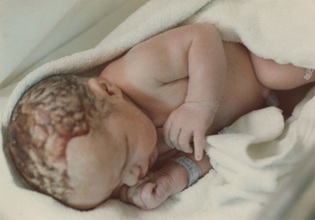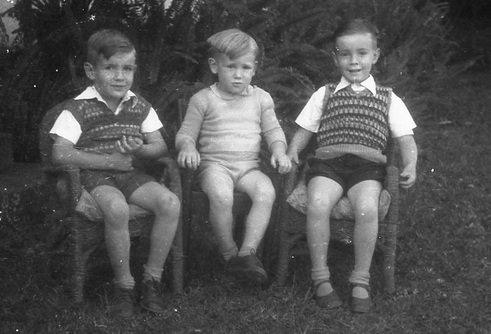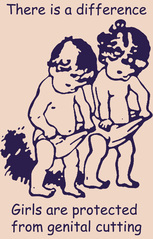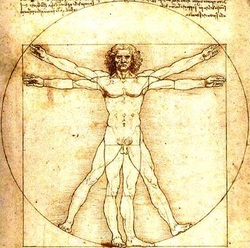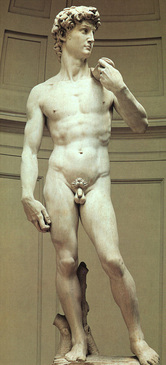(see original article here)
This is an email I just sent to the mohel who performed my circumcision 21 years ago today. My goal in sending this was to show him the perspective of someone who wished he hadn’t been circumcised, so that he would understand what his profession could do and maybe so he would question his continued participation in the field. I’ve chosen to publish this openly for two reasons: So that my friends and family can understand how I feel personally about my circumcision (rather than just my intellectual position on circumcision in the abstract), and so that anyone out there who is considering performing a circumcision or having one performed might change their minds.
Before I get to the email, a few notes:
- The account includes personal descriptions involving my genitalia. While there is nothing graphically sexual and no pictures or anything, this may make some uncomfortable.
- I’m well aware that my parents had a significant role to play in my circumcision as well. I do not mean this letter to be construed as faulting only Rabbi Henesch. I am still not sure how to discuss this topic with my parents, or even if I should considering that they will not be in the position to circumcise another boy in the future.
- In the email, I used some transliterated Hebrew phrases that I can be sure Rabbi Henesch knows and that some of my readership doesn’t. Such phrases will be explained in square brackets; these brackets were not included in the original email.
You wouldn’t remember me, but 21 years ago you changed my life. Like most of your clients, I was eight days old at the time, so I doubt I was able to articulate my thoughts on the procedure. But now I’ve had a fair amount of time living with the effects of your work, and I’d like to share with you my perspective on what you did to me.
If you haven’t guessed by my tone, I wish I hadn’t been circumcised. I could show you studies that I believe demonstrate the deleterious effects of the procedure on infants, the costs to the adults that had the procedure done earlier in life, and the falsity of the supposed health benefits of circumcision, but I won’t. There are dedicated organizations that can convey that information far better than I could. What I have to offer you is my personal experience, the costs I believe your action has lead me to bear, in the hope that you might understand on a personal level the potential for harm that comes with your profession, and perhaps even consider leaving it. This account will be both physically and spiritually personal, but as someone who has had a permanent impact on my genitals I think we’re past those types of boundaries.
Almost every single day, for as long as I can remember, I have at one point or another felt discomfort in the tip of my penis. It doesn’t matter what type of undergarments I wear, if I wear pants or shorts, or whether I’m sedentary at a desk all day or out playing a sport: eventually, my penis will brush against something in an unpleasant way. It’s not a major discomfort or pain, but it’s there and it’s noticeable, and it doesn’t feel natural. It makes me feel like something is wrong, like something is somewhere it doesn’t belong, and there’s nothing at all like it for any other parts of my body that are covered in clothing all day. I can’t verify this personally, but apparently this is a problem that only happens to some circumcised men, and not to any intact ones. In fact, it is my understanding that intact men experience significantly less genital chafing in any circumstances. Regardless of the cause, the fact remains that most days I get a physical reminder of a fact of my biology that I strongly wish wasn’t so.
The permanently uncovered portions of my glans are calloused. They aren’t big callouses like might form on your hands, but the skin is thicker, tougher, and less sensitive than the skin of the glans still partially covered.
I have a scar around my penis, a visual reminder of what used to be there that I never knew. It’s not nearly as bad as some of the extreme examples of circumcisions gone wrong that I’ve seen, but it’s there and noticeable. It certainly doesn’t make me look more attractive than I otherwise would.
The area underneath the folded shaft skin that remains regularly collects dust, lint, and other foreign particles. Though I wash daily, it is fairly sticky and catches occasionally on my pubic hair or the cloth of my underwear, resulting in an unpleasant sensation when it becomes uncaught.
Sex and masturbation are less enjoyable than they could have been. I have good reason to believe, given the callouses I can feel and the physical sensitivity studies that I’ve read, that I am not capable of the same level and variety of physical pleasure that would have been available to me had I been left intact. I lose out on the sensation of loose skin sliding up and down my penis during intercourse or masturbation. My penis has less natural lubrication than it should. Sexual activity causes more friction than it should. Sexual activity is more likely to leave my penis feeling raw and sensitive for some time after the fact than it should. I am more likely to require supplemental lubrication for intercourse than I should. In particular, masturbation is more abrasive, less pleasurable, and overall more difficult than it should be (which, not incidentally, was one of the leading arguments that led to the rise in circumcision rates among non-Jewish Americans).
These physical problems are not insignificant, and I think they alone would be enough for me to regret what happened to me, but they pale in comparison to the spiritual problems. You see, Rabbi Henesch, I do not consider myself a religious Jew. Culturally, I still maintain some of the familial values and some practices, especially those that bring me closer to my family, but I do not believe in God and do not find spiritual or moral guidance from the Tanach [The Old Testament, including the Torah] or the Rabbis. I grew up going to shul [synagogue], celebrating the holidays, going to Sunday School, having a Bar Mitzvah [the Jewish coming-of-age, at 13 for boys], and even going to a Jewish Day School, yet today I am in almost complete control over the extent to which Jewish culture and Jewish religion play a role in my daily life. The exception is circumcision: For the rest of my life, I will have to live with a penis that was cut in the name of a covenant I did not agree to with a being I do not believe exists. I expect you are a civilized man and that you would balk at the idea of adults being forced to express belief in a system they have not personally chosen, whether that expression comes in the form of a requirement to wear a cross around your neck or even a requirement that all who were born Jewish wear the tallit katan [a four-cornered garment with long fringes that is worn under everyday clothing]. Yet that is what the circumcision ritual does: it forces one participant, someone who has just barely opened his eyes to see the world, to bear a permanent, irreversible mark of the religion of the other participant. The Jewish cultural practices I’ve chosen to keep remind me of the goodness and greatness that comes from some aspects of Judaism. The physical modification I cannot change reminds me of all of the bad that helped lead me to reject it as a whole.
At one point, not too long ago, I hated you. I wanted to rage at you, to extract justice from you, to make you explain yourself. But I understand now. I understand how you could have chosen your profession, how you could have chosen to do this to me. Circumcision is viewed as a badge of honor in Judaism, is seen as fundamental to many aspects of the religion, and has a history of being a symbol for the autonomy that the Jews have held on to in the face of tyrannical governments and cultures that have conquered them in the past. I do not condone it, but I can understand why someone raised in that culture might view your job as holy and celebrated, and never even question the possible downsides. But now, you don’t have that luxury. You’ve seen the other side of the issue and now you have a choice to make.
Out of the hundreds or thousands of circumcisions you’ve done, it’s possible I’m the only one who regrets it. But next time you stand over a baby boy, ready to cut, ask yourself: Can I be sure that this boy won’t be the same? Can I be sure that I’m not dooming this child to a life of physical discomfort and inconvenience? Can I be sure that this child will embrace my faith and this symbol of it for the rest of his life? Can I be sure that I have the right to make this decision for him?
You might respond: what about the majority, those who never have any physical problems and remain religious Jews their whole life? Well, my question to you would be: What would they lose? Do Jewish daughters have a less joyous start to their life due to the simchat bat [the female celebration of birth ceremony, with no analogue to circumcision] not including any permanent physical modification? Do Jewish women who retain their faith into adulthood have any less of a role in God’s covenant with Abraham as a result of their lack of a bodily symbol of the contract? And could not a Jewish man who was left intact, upon reaching adulthood, decide that he would like to be circumcised? Given that half of the Jewish population manage to be celebrated members of the community without circumcision and that the other half could choose circumcision when they are more aware of what Judaism means to them, can you justify your next cut?
Regards,
Shea Levy

